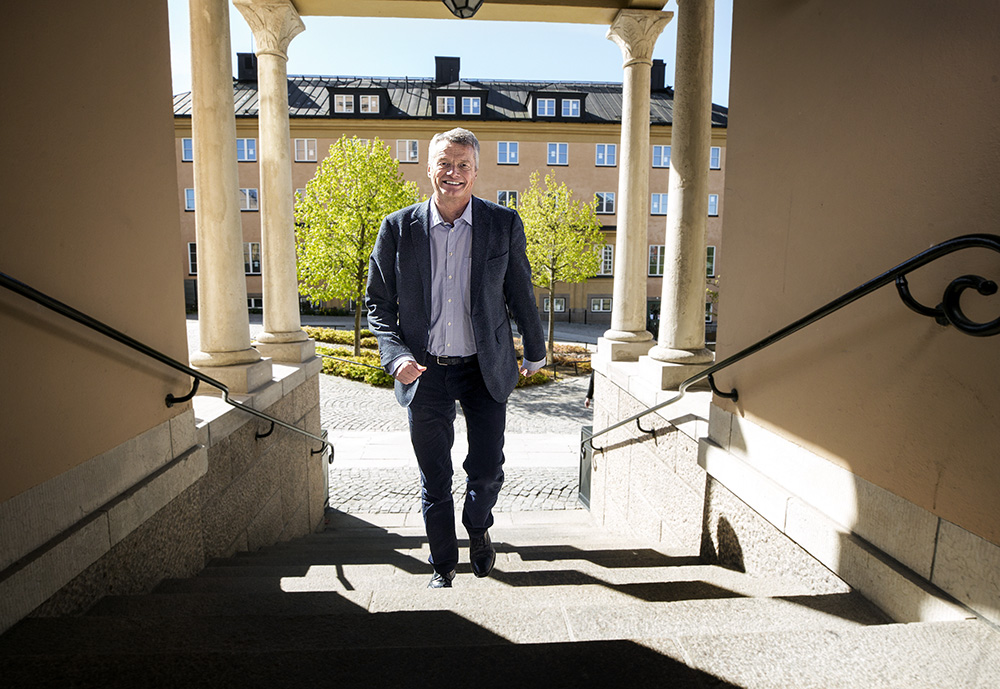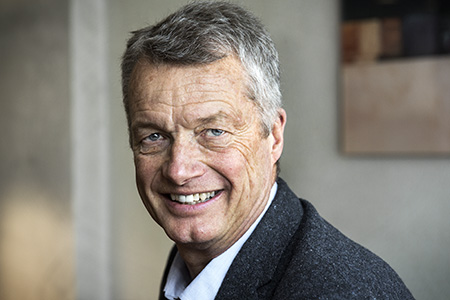
Anders Lundgren ends as University Director
In August 1994, Anders Lundgren arrived at KTH. Now, nearly 25 years later, he is leaving his post as University Director.
“Knut Styffe and I hold the record. We’ve both been part of KTH management for almost the same length of time.”
How similar Lundgren is to Director General Styffe who headed the Institute of Technology from 1856 to 1890 is less clear.
“I have no idea if we have any similarities, but after spending such a long time in management, you become as "one with KTH" in a way. You’re happy when things are going well for us and less happy when things are going not so well,” says Lundgren who speaks rapidly and with a tempo that is pretty contagious.

He is just as quick to answer as to react if he thinks the interview is not going to plan. Comments such as “you can’t write that” or “you can’t ask that”, intersperse our 20 minutes together.
With a background as a teacher at IFL/SSE and as head of training and head of marketing at Scania on his CV, Lundgren arrived at KTH.
“Scania and KTH are alike in many ways. I think it is a good thing that not everyone in management comes from KTH or has a background in engineering.”
In parallel with developing administration at KTH and ensuring sound financial and administrative vigour, Lundgren has held a number of other positions within administration; Administrative Director at Kista, CFO, Head of Education Administration, Head of HR, Head of Innovation. He has also taught in all KTH civil engineering programmes and has been a keen participant in third-cycle courses.
“I think it’s good to do more things within administration than purely being the University Director. With good employees around me, this has worked very well. If you are part of management and the university director, I think a good principle is to avoid being financed via “gross profit”. If I were to put external financing demands on university activities, the same would have to apply for my own direct costs.”
Management, finances and leadership are a common denominator in his line of work. He has also completed a PhD on how large organisations should be managed.
But as University Director, you’ve also been a bit of a controversial figure, haven’t you?
“Where I am on the scale of liked/controversial doesn’t bother me. What has been important for me in my position, is to distance myself from the academic establishment in order to guarantee my integrity on different issues.”
He also says he is not a fan of extended decision-making processes.
“It can sometimes be far too tempting and easy as the university director to hide behind rules, guidelines and procedures. Obviously they are important, but you have to form your own opinion, be prepared to take a stance and take responsibility for it.”
He has achieved a great deal and is now on his fifth president, and crucial changes have paved the way for the KTH of today.
“KTH’s growth, internationalisation, the development of study programmes, digitalisation and the fact that during my time, KTH has become a far more research-oriented university are remarkable changes,” Lundgren says.
When it comes to how well administration in a complex organisation can adapt to new realities, Lundgren is happy.
“KTH has good administration. Compared to other universities, we have come a long way when it comes to efficiency, cost levels and service.”
Values issues, leadership training and administration issues have been other concerns close to his heart.
“Courage and feedback are important watch words. I have tried to communicate this to my colleagues.”
Lundgren has also been involved in student issues and pursued such matters as more student residences on campus. In the spring, he was named A friend of Stockholm Students, by the Stockholm Students’ Unions organisation SSCO (link)
“Which was pleasant. It’s students who make KTH what it is. Without them, we wouldn’t exist.”
What will KTH look like in another 25 years?
“Sweden will become an ever increasing exporter of services and here KTH will play a key role. Perhaps we will have 100,000 students and be a key part of innovation and new enterprise. And we will certainly win a Nobel Prize within the next ten years.
Based on the motto “if you think higher education and research is expensive, try ignorance”, we will continue to be a leading European university.
Words: Jill Klackenberg

